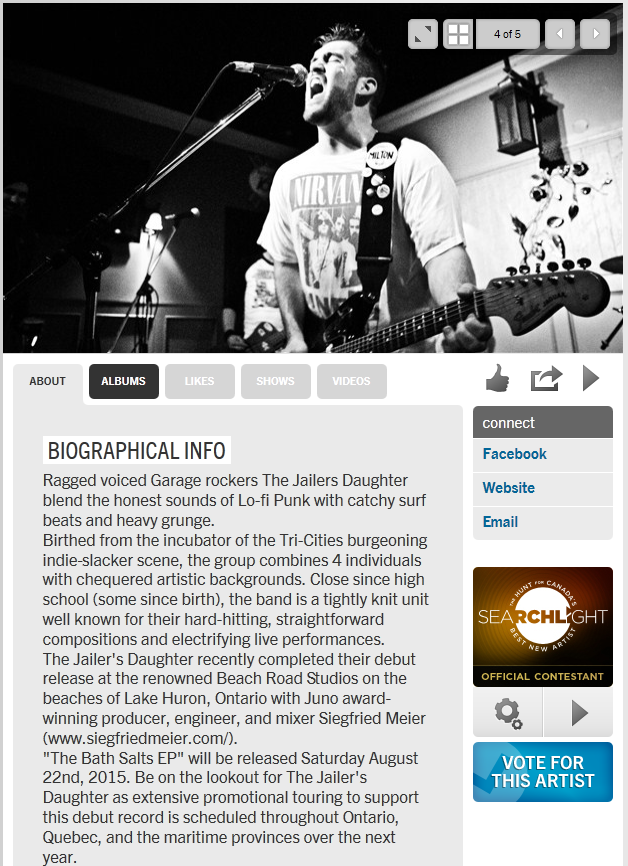Published on 2 Jan 2015
What does the supply curve show us? This video takes a look at what we can tell from the supply curve about the behavior of sellers and quantities supplied at different prices. We’ll talk about producer surplus as well as factors that lead to an increase in supply and a decrease in supply — and we’ll provide a list of these important supply shifters.
April 10, 2015
A Deeper Look at the Supply Curve
The Armenian Genocide I THE GREAT WAR – Week 37
Published on 9 Apr 2015
The leaders of the Ottoman Empire are looking for a scapegoat after their collosal defeat in the Caucasian Mountains a few month earlier. They start the systematic relocation and disarm Armenian troops among their ranks to end all calls for Armenian independence. Today’s estimates place the death toll of the genocide up till 1.5 million men, women and children.
The Jailer’s Daughter on the CBC
Well, technically it’s the CBC’s website, but still it’s nice to see the band getting a bit of exposure:
“Scotland in the 21st century is a hotbed of the new authoritarianism”
Brendan O’Neill on the odd disconnect between American views of Scotland (roughly summed up by kilts, whisky, and Braveheart) and the reality:
… far from being a land of freedom-yearning Bravehearts, Scotland in the 21st century is a hotbed of the new authoritarianism. It’s the most nannying of Europe’s nanny states. It’s a country that imprisons people for singing songs, instructs people to stop smoking in their own homes, and which dreams of making salad-eating compulsory. Seriously. Scotland the Brave has become Scotland the Brave New World.
If you had to guess which country in the world recently sent a young man to jail for the crime of singing an offensive song, I’m guessing most of you would plumb for Putin’s Russia or maybe Saudi Arabia. Nope, it’s Scotland.
Last month, a 24-year-old fan of Rangers, the largely Protestant soccer team, was banged up for four months for singing “The Billy Boys,” an old anti-Catholic ditty that Rangers fans have been singing for years, mainly to annoy fans of Celtic, the largely Catholic soccer team. He was belting it out as he walked along a street to a game. He was arrested, found guilty of songcrimes—something even Orwell failed to foresee—and sent down.
It’s all thanks to the Offensive Behaviour at Football Act, which, yes, is as scary as it sounds. Introduced in 2012 by the Scottish National Party, the largest party in Scotland the Brave New World and author of most of its new nanny-state laws, the Act sums up everything that is rotten in the head of this sceptred isle. Taking a wild, wide-ranging scattergun approach, it outlaws at soccer matches “behaviour of any kind,” including, “in particular, things said or otherwise communicated,” that is “motivated (wholly or partly) by hatred” or which is “threatening” or which a “reasonable person would be likely to consider offensive.”
Got that? At soccer games in Scotland it is now illegal to do or say anything — and “in particular” to say it — that is hateful or threatening or just offensive. Now, I don’t know how many readers have been to a soccer game in Britain, but offensiveness, riling the opposing side, is the gushing lifeblood of the game. Especially in Scotland. Banning at soccer matches hateful or offensive comments, chants, songs, banners, or badges — all are covered by the Offensive Behaviour Act — is like banning cheerleaders from American football. Sure, our cheerleaders are gruffer, drunker, fatter, and more foul-mouthed than yours, but they play a similarly key role in getting the crowds going.
The Offensive Behaviour Act has led to Celtic fans being arrested in dawn raids for the crime of singing pro-I.R.A. songs — which they do to irritate Rangers fans — and Rangers fans being hauled to court for chanting less-than-pleasant things about Catholics.
Even blessing yourself at a soccer game in Scotland could lead to arrest. Catholic fans have been warned that if they “bless themselves aggressively” at games, it could be “construed as something that is offensive,” presumably to non-Catholic fans, and the police might pick them up. You don’t have to look to some Middle Eastern tinpot tyranny if you want to see the state punishing public expressions of Christian faith — it’s happening in Scotland.
QotD: Zoning hurts the poor
One kind of regulation that was actually intended to harm the poor, and especially poor minorities, was zoning. The ostensible reason for zoning was to address unhealthy conditions in cities by functionally separating land uses, which is called “exclusionary zoning.” But prior to passage of the Civil Rights Act of 1968, some municipalities had race-based exclusionary land-use regulations. Early in the 20th century, several California cities masked their racist intent by specifically excluding laundry businesses, predominantly Chinese owned, from certain areas of the cities.
Today, of course, explicitly race-based, exclusionary zoning policies are illegal. But some zoning regulations nevertheless price certain demographics out of particular neighborhoods by forbidding multifamily dwellings, which are more affordable to low- or middle-income individuals. When the government artificially separates land uses and forbids building certain kinds of residences in entire districts, it restricts the supply of housing and increases the cost of the land, and the price of housing reflects those restrictions.
Moreover, when cities implement zoning rules that make it difficult to secure permits to build new housing, land that is already developed becomes more valuable because you no longer need a permit. The demand for such developed land is therefore artificially higher, and that again raises its price.
Sandy Ikeda, “Shut Out: How Land-Use Regulations Hurt the Poor”, The Freeman, 2015-02-05.




